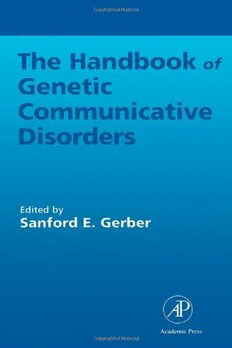
Handbook of Genetic Communicative Disorders PDF
291 Pages·2001·14.7 MB·English
Most books are stored in the elastic cloud where traffic is expensive. For this reason, we have a limit on daily download.
Preview Handbook of Genetic Communicative Disorders
Description:
Many professionals in the communicative sciences are relative newcomers to the understanding of genetics as it applies to communicative disorders. A speech-language clinician certainly can diagnose and treat stuttering, for example, but that clinician may not be fully aware of the role of a genetic counselor for the family of a stutterer. An audiologist may be able to assess a hearing impairment, but an understanding of the underlying genetics of that impairment would make that person a better audiologist. The medical geneticist, similarly, could have an inadequate appreciation of how our genes may affect language function. All of these professionals need a source that brings together essential ideas from related disciplines. This is a book about human communication, both normal and disordered, and how our communication abilities are affected by our genes. Many, probably most, communicative disorders are of genetic origin, even if not exclusively genetic. A knowledge of genetics, therefore, is essential to our understanding of communication, of communicative disorders, of how such disorders come about, and of how to deal with them. This is the only book to consider the genetics of communicative disorders from a broad perspective. It examines genetics, embryology, and epidemiology, along with study of the hearing, speech, and language disorders themselves. It also introduces review of issues relevant to genetic counseling and ethics. It is a unique and comprehensive work whose contributors are the leading experts in their respective disciplines. * Only book available to consider all communicative disorders * Unparalleled scrutiny of the sciences basic to the genetics of communicative disorders * Specific attention paid to clinical and ethical issues
See more
The list of books you might like
Most books are stored in the elastic cloud where traffic is expensive. For this reason, we have a limit on daily download.
